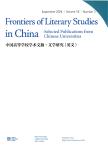Zoology, Celibacy, and the Heterosexual Imperative: Notes on Teaching Lu Xun's "Loner" as a Queer Text
Zoology, Celibacy, and the Heterosexual Imperative: Notes on Teaching Lu Xun's "Loner" as a Queer Text作者机构:Department of Literature University of California San Diego CA 92093 USA
出 版 物:《Frontiers of Literary Studies in China-Selected Publications from Chinese Universities》 (中国高等学校学术文摘·文学研究(英文版))
年 卷 期:2013年第7卷第3期
页 面:441-458页
学科分类:0501[文学-中国语言文学] 0710[理学-生物学] 05[文学] 07[理学] 071002[理学-动物学]
主 题:queer Lu Xun zoology celibacy modem Chinese literature "TheLoner," pedagogy
摘 要:This essay reflects on the reception of Lu Xun's short story "The Loner" (Gudu zhe, alternately translated as "The Lone Wolf, The Misanthrope," and "The Isolate") in American classrooms, where students have sometimes wondered whether that character might be read as "queer." It suggests that the title character's unusual and self-imposed celibacy is probably best explained by his belief, in a very general sense, in the foundational values of zoology as practiced in Japan and China in the late nineteenth and early twentieth centuries, and thus that the story may be a better gateway to understanding the ways in which Lu Xun envisioned the mixed impact of new political economies on private life than a source text for queer studies. At the same time, however, this essay emphasizes that in "The Loner," as elsewhere, accounting for the "heterosexual imperative" of early zoology (e.g., with its emphases on animal husbandry, propagation, reproduction) can have meaningful consequences for "queering" interpretations of received texts from literature, history of science, and beyond.



